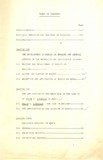| dc.description.abstract | It is undeniable that much of Kenyan law finds its
source, either directly or indirectly, in England. This
is easy to understand since Kenya was, until 1963, a
British colony and it was the usual custom of the
British colonialists in the absence df any applicable
local law, to apply rules of law then operating in
England to the new colony. Even after independence
Kenya. inherited certain English statutes, common law
and doctrines of equity. The local statutes have
been modelled along their English counterparts. This
dissertation is concerned with the application of the
doctrines of equity. in Kenya, hence its objective is
two-fold: to survey the reception and principles
which can be extracted from the cases to rationalize
the circumstances in which the doctrines of equity have
been applied in Kenya, and secondly to set out certain
instances in which these doctrines have been applied
by the courts. In so doing it is intended that the
contribution and usefulness of these doctrines in the
administration of justice in Kenya will become clear.
'Equity' has been used in the dissertation in two
main ways, firstly, it refers to the technical rules
of equity that developed alongside and ameliorated the
rigorous of, the cOm1on law. | en_US |

